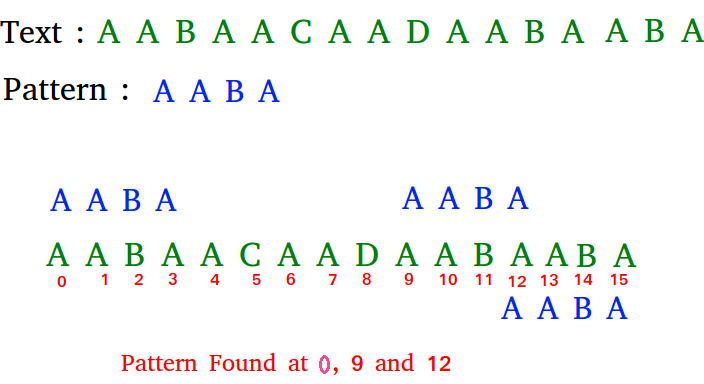用于模式搜索的 KMP 算法的Python程序
给定一个文本txt[0..n-1]和一个模式pat[0..m-1] ,编写一个函数search(char pat[], char txt[])打印txt中所有出现的pat[] [] 。您可以假设n > m 。
例子:
Input: txt[] = "THIS IS A TEST TEXT"
pat[] = "TEST"
Output: Pattern found at index 10
Input: txt[] = "AABAACAADAABAABA"
pat[] = "AABA"
Output: Pattern found at index 0
Pattern found at index 9
Pattern found at index 12
模式搜索是计算机科学中的一个重要问题。当我们在记事本/word 文件或浏览器或数据库中搜索字符串时,会使用模式搜索算法来显示搜索结果。
Python3
# Python program for KMP Algorithm
def KMPSearch(pat, txt):
M = len(pat)
N = len(txt)
# create lps[] that will hold the longest prefix suffix
# values for pattern
lps = [0]*M
j = 0 # index for pat[]
# Preprocess the pattern (calculate lps[] array)
computeLPSArray(pat, M, lps)
i = 0 # index for txt[]
while i < N:
if pat[j] == txt[i]:
i += 1
j += 1
if j == M:
print ("Found pattern at index", str(i-j))
j = lps[j-1]
# mismatch after j matches
elif i < N and pat[j] != txt[i]:
# Do not match lps[0..lps[j-1]] characters,
# they will match anyway
if j != 0:
j = lps[j-1]
else:
i += 1
def computeLPSArray(pat, M, lps):
len = 0 # length of the previous longest prefix suffix
lps[0] # lps[0] is always 0
i = 1
# the loop calculates lps[i] for i = 1 to M-1
while i < M:
if pat[i]== pat[len]:
len += 1
lps[i] = len
i += 1
else:
# This is tricky. Consider the example.
# AAACAAAA and i = 7. The idea is similar
# to search step.
if len != 0:
len = lps[len-1]
# Also, note that we do not increment i here
else:
lps[i] = 0
i += 1
txt = "ABABDABACDABABCABAB"
pat = "ABABCABAB"
KMPSearch(pat, txt)
# This code is contributed by Bhavya Jain输出:
Found pattern at index 10有关更多详细信息,请参阅关于模式搜索的 KMP 算法的完整文章!